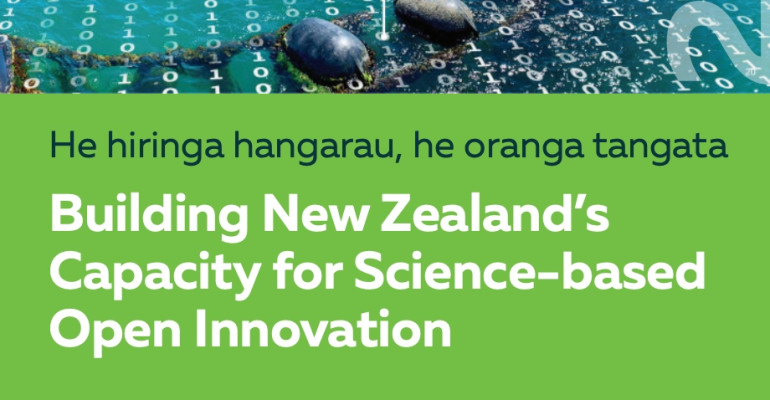SfTI releases report revealing connection at the heart of successful innovation
9 December 2022 | Read time: 5 minutes

If you read the news you would be forgiven for thinking that innovation is the realm of driven and ruthless individuals or tech superstars. But this is far from the reality of successful science innovation in Aotearoa, as uncovered in a report from the unique longitudinal study from The Science for Technological Innovation National Science Challenge (SfTI).
SfTI’s Building New Zealand's Innovation Capacity (BNZIC) research team, who have been working to gather data from across the Challenge’s research programme since 2016, have released a report addressing what’s really going on in Aotearoa’s science system. What’s working and what is not. The findings are clear. Ambition, competition and tech genius, only take you so far. We can get more from our science and innovation sector through new types of collaboration.
SfTI’s research programme is focussed on physical sciences and engineering in mission-led, and ‘stretch science’ environments. This report takes its findings from across SfTI which involves over 500 researchers, 41 organisations, and over a hundred research projects from large to small. The BNZIC team’s research seeks to systematically assess what changed over time and then promote new and more effective ways to accelerate innovation.
Katharina Ruckstuhl (Ngāi Tahu, Rangitāne) is Co-Leader on this report and SfTI’s Theme Leader Vision Mātauranga.
“This report is the first of its kind and the findings involve clear guidance to equitably accelerate science-based innovation in Aotearoa. SFTI as an innovation organisation has set out to change practice in how science teams operate when guided by users, whether industry or Māori. Really what we see this comes down to is facilitating the right environmental conditions where connection happens and sustains.”
“This report is the first of its kind and the findings involve clear guidance to equitably accelerate science-based innovation in Aotearoa. SFTI as an innovation organisation has set out to change practice in how science teams operate when guided by users, whether industry or Māori. Really what we see this comes down to is facilitating the right environmental conditions where connection happens and sustains.”
“Actively connecting scientists to non-scientists and particularly industry and Māori innovation partners is part of this. The Māori innovation space is unique to Aotearoa, but the lessons likely have global relevance. Essentially by building genuine and long-term connections we see mātauranga enacted at quite a fundamental level in technological innovation.”
SfTI’s Director Sally Davenport says that the BNZIC report is very timely.
“This report coincides with the release of the Te Ara Paerangi – Future Pathways review of the research, science and innovation (RSI) system White Paper. The New Zealand government is actively reshaping Aotearoa's innovation system, and this report from our BNZIC team provides important reading.”
It identifies four trends that accelerate innovation:
Trend one: Moving beyond Traditional Science
This trend suggests innovation is accelerated when collaboration with non-scientists is promoted. This is done through a mission led approach to team design and the use of ‘innovation intermediaries’ to connect people throughout the innovation journey.
Trend two: Opening Science for Open Innovation
Open innovation is a shift from more traditional and competitive closed practices. This collaborative approach involves finding ways to navigate the limits of intellectual property (IP) concerns and other barriers to open information sharing.
Trend three: Opening Science for Māori Innovation
The Māori economy is a huge opportunity and strength for Aotearoa’s science system. Supporting innovation means finding ways to open up the science system for mātauranga Māori and Māori scientists. This is promoted via removing barriers such as the current disproportionate weight of work on Māori scientists, concerns over ownership and use of Māori data and the need for ‘Māori non-scientist matchmakers’.
Trend four: Developing entrepreneurial behaviours
This trend involves providing support for scientists to develop the skills and capacity to collaborate well and make long term and authentic connections.
Urs Daellenbach, BNZIC Co-Leader, says the BNZIC team will continue to study innovation until the conclusion of the Challenge.
“This is important work in that it captures what we have learnt in the Challenge. All the National Science Challenges are wrapping up in 2024 and it’s imperative that we understand what worked and what did not and how best to inform Aotearoa’s innovation system into the future”
“This study tells us that we need to help scientists connect with non-scientists and create a system where multi disciplinary teams are the norm. Where industry and Māori are intrinsically part of the process”